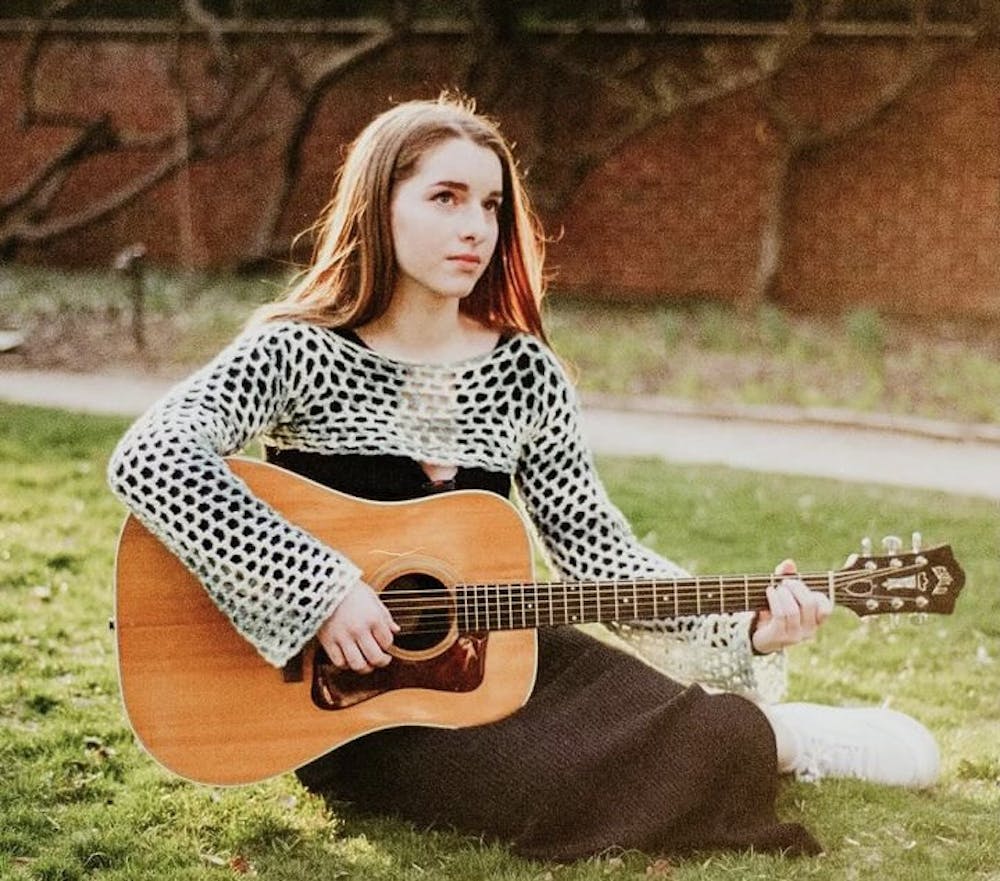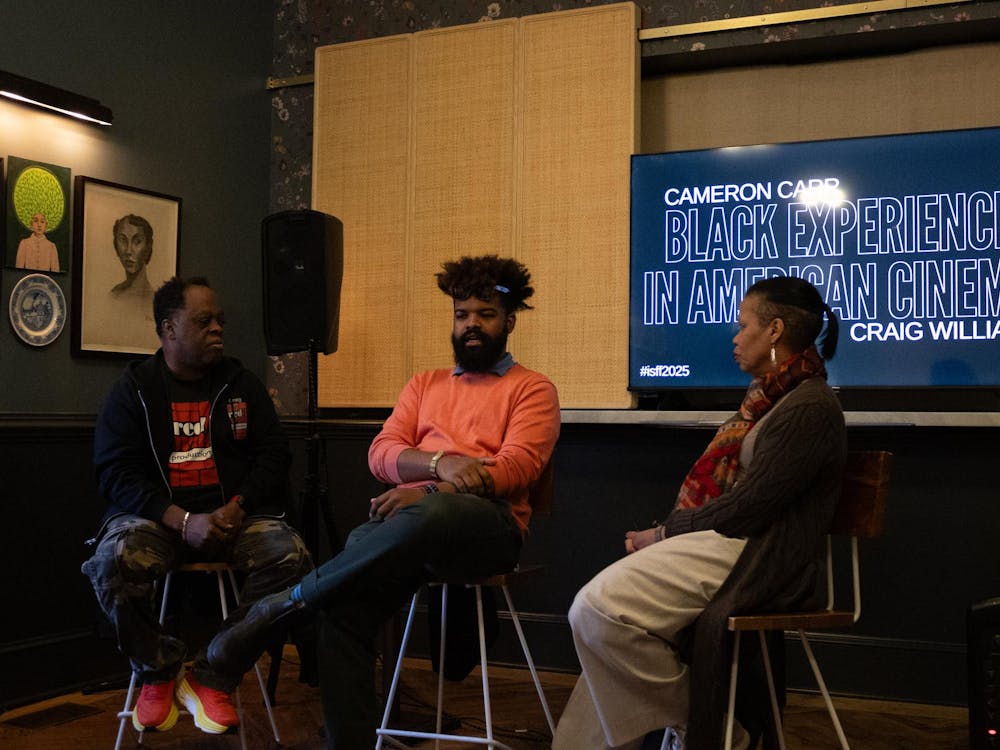Amid a steady guitar strum, a warm, full voice delivers the lyrics, “She sees a chance in her reflection on the wall / No matter the humidity or height of the paywall / ‘Cause she’s pretty in passing and I’m better for some time.”
These vocals describe a girl who, according to the songwriter, is effortlessly beautiful. For her, maintaining her appearance requires little more than a passing glance in the mirror. An uneven rhythmic pulse supports these lyrics, stumbling as if to emphasize some insecurity in the speaker. Such a nuanced composition might be commonplace for a track by a professional musician. Rather, this song titled “Insight” belongs to “Precipice,” the latest album by first-year College student Niamh Kierans.
“Precipice,” released March 1, is composed of eight songs with a total running time of just over 30 minutes. The album cover depicts sand falling through an individual’s hands against a reddish-orange backdrop.
Kierans’s musical journey began well before the release of “Precipice.” She got her start with classical singing lessons, learned to play the ukulele when she was 10 and taught herself the guitar two years later. After practicing these instruments, she sought to explore more contemporary music styles and her passion for songwriting grew from there. To further pursue this interest, Kierans started lessons at Sound House, a music school in Remington, Va. that mentors aspiring musicians, when she was in the eighth grade.
There, Kierans met and studied with Maddi Mae, owner of Sound House and a professional folk songwriter and musician. According to Kierans, part of Mae’s lessons included the opportunity to record song demos, which proved invaluable as she began to develop “Precipice.”
“I didn't know what direction I wanted to go in for my song “Ha’aretz” and so I took it to her at one of my lessons, and I thought we would just figure out some guitar, but we ended up recording the whole song,” Kierans said.
Led by her affinity for songwriting and valuable mentorship at Sound House, Kierans released her debut album in 2021 titled “Self and Destruction.” A collection of 10 songs, the name of the album captures its central themes — “ponderings of the self and the ways people hurt each other," according to Kierans in an interview with “The Bern Block.”
While it is Kierans’ compelling writing, vocals and guitar playing that allows her albums to shine, creating songs is not a completely independent endeavor for the musician. In addition to Mae, Kierans collaborates with two producers, Nico Arouca and Carly Flatau, who mix and master her music and create instrumentation to complement Kierans’ vocals and strumming.
According to Kierans, Arouca and Flatau are a crucial part of her music-making process, particularly due to their willingness to adapt to Kierans’ musical vision.
“They're willing to let go of things that they put in there,” Kierans said. “They're willing to change things about it for what I want it to be, and that's really necessary. And that makes a really great producer.”
Kierans’ persuasive artistry and the effort of her collaborators paved the way for the release of her second album, “Precipice.” According to Kierans, “Precipice” was initially conceived as a “from-the-vault” album — a collection of tracks that she wrote at various stages in her life — a vision that ultimately shifted. As work on the album progressed, Kierans realized that she had written many of the songs during periods of significant personal change — some during her final year of high school and others just as she was meeting her significant other.
“A lot of them are sort of, whether I knew it or not at the time, leading up to this huge moment of change,” Kierans said. “And then I wrote the second half of it, when I had just met my current boyfriend … I really liked that idea of things leading up to this precipice. And then after, you fall — in love.”
“Precipice'' begins with the contemplative track “Ha’aretz.” In the song, Kierans sings, “I’ve got homelands not home to me,” an expression of her Jewish and Irish identities and the extent to which she belongs to each. This song shines in no small part due to Kierans’ collaboration with Mae — Mae’s instrumentation and mixing creates a sonic environment that is both warming and unsettling, apt for the album’s central motif of change.
“Chasing Whispers'' follows the opening track. The song features the lyric, “You’re doused in pride / And I’m left in the dust,” a biting remark that reminds the listener thematically of Kierans’ first album. The piece also stands out because of when it was written — Kierans composed the song when she was 14, hence her initial planning of “Precipice'' as a “from-the-vault” record.
“A Desperate Race” arrives in the middle of the album. A reflective piece about what it means to be authentic, Kierans broods, “I just wanna know / The essence of it all / A moment where I’m human and not faking it all.” The album concludes with “This Time Around,” an earnest love song to embrace the listener following the change and insecurity depicted in “Precipice.”
While “Precipice'' chronicles a rather recent period in Kierans’ life, the album in many ways represents a symbolic distillation of her musical journey. From her lush vocals, to her guitar strumming to the refinements made by her collaborators, the work is a composite of various stages in artistic progression — one that is certainly not at a precipice, but bound to blossom indefinitely.
According to Kierans, her most meaningful songs are those in which the ideas are universal, allowing audiences to connect with Kierans regardless of their personal backgrounds and circumstances.
“If you can listen to a song and be like, ‘Oh, yeah, I know what that's about,’ [even if] you don't know what events I'm talking about … what person I'm talking about or even what time, but you can relate it to an experience in your own life — I really, really love when my songs can do that,” Kierans said.
Music fans can listen to Niamh Kierans’ album “Precipice” on Spotify or Apple Music now.







